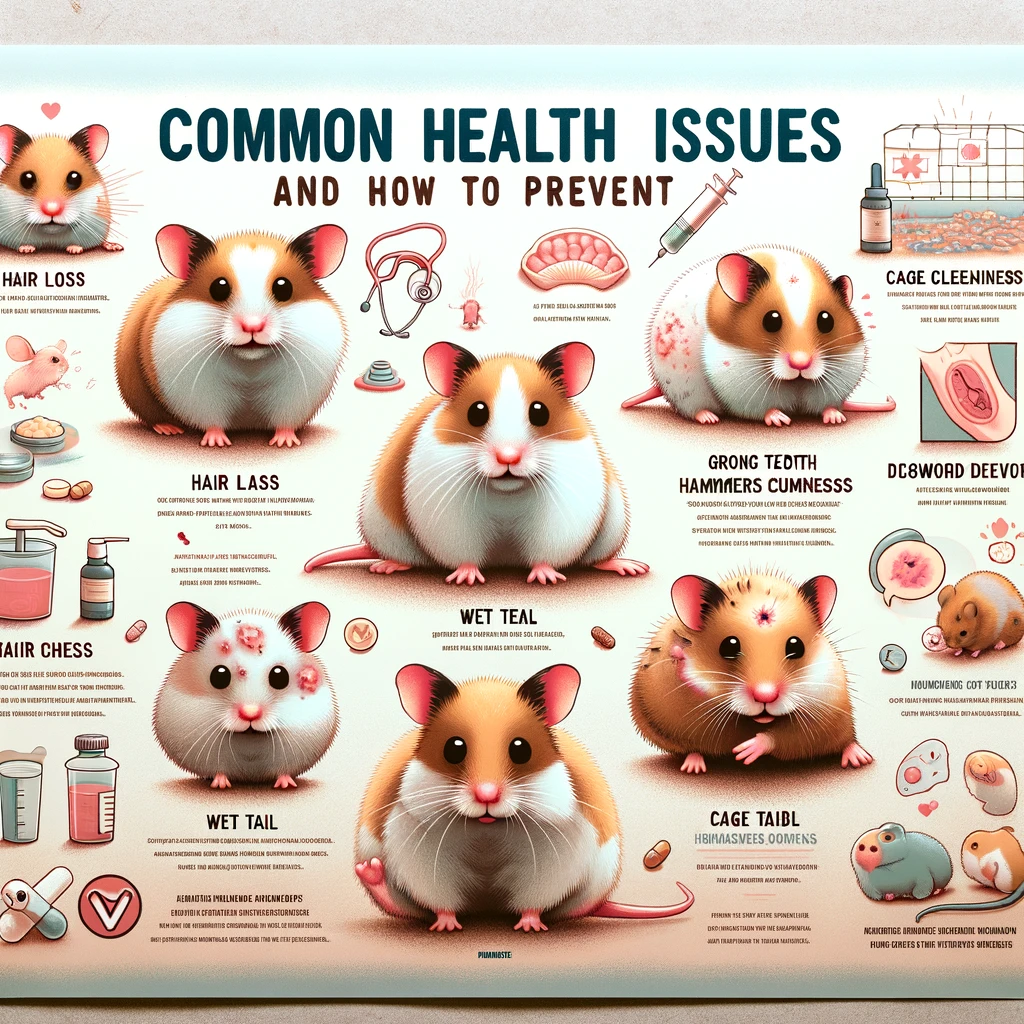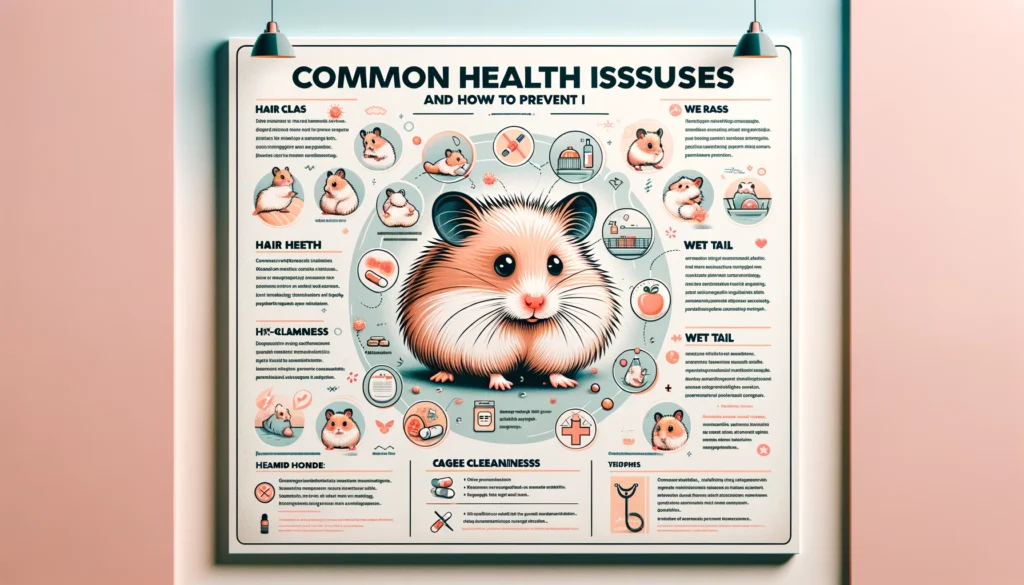Common Health Issues In Hamsters And How To Prevent Them – Hamsters.pk
Understanding Common Health Concerns: A Guide to Hamster Wellness
Hamsters are delightful little creatures known for their playful antics and adorable appearance. However, like all pets, they are susceptible to various health issues that can affect their well-being. As responsible pet owners, it’s crucial to understand these common health concerns and take proactive steps to prevent them. In this comprehensive guide, we’ll delve into some of the most prevalent health issues hamsters face and provide essential tips on how to ensure your furry friend stays happy and healthy.
1. Respiratory Infections: Guarding Against Breathing Problems
Respiratory infections are among the most frequent health issues encountered by hamster owners. These infections can be caused by a variety of factors, including poor ventilation, stress, drafts, and bacterial or viral pathogens. Symptoms of respiratory infections in hamsters may include sneezing, nasal discharge, labored breathing, and lethargy.
To prevent respiratory issues, it’s crucial to maintain a clean and well-ventilated environment for your hamster. Regularly clean the cage, avoid using dusty bedding, and keep the cage away from drafts. Additionally, minimizing stress and providing a balanced diet rich in vitamins can help bolster your hamster’s immune system.
2. Dental Problems: Ensuring Proper Oral Health

Dental issues are common among hamsters and can lead to significant discomfort if left untreated. Hamsters have continuously growing incisors, and overgrown teeth are a prevalent concern. If a hamster’s teeth become overgrown, it can result in difficulty eating, drooling, and weight loss.
To prevent dental problems, provide your hamster with chew toys made of safe materials to help wear down their teeth. Additionally, ensure their diet includes hard foods that require chewing, such as pellets and fresh vegetables. Regularly monitoring your hamster’s teeth and seeking veterinary attention if you notice any abnormalities is essential for maintaining their oral health.
3. Wet Tail Syndrome: Managing Gastrointestinal Distress
Wet Tail syndrome, also known as proliferative ileitis, is a severe gastrointestinal condition that primarily affects young hamsters. It is often associated with stress, poor hygiene, and bacterial infections, particularly those caused by the Bacillus species. Symptoms of wet tail include diarrhea, lethargy, hunched posture, and wetness around the tail area.
Preventing wet tail syndrome involves maintaining a clean living environment for your hamster, ensuring they have access to fresh water and nutritious food, and minimizing stressors. If you suspect your hamster may have wet tail, seek immediate veterinary care, as prompt treatment is essential for their recovery.
4. Obesity: Promoting Healthy Weight Management
While hamsters are naturally active animals, obesity can still become a significant health concern if they are overfed or lack exercise. Obesity in hamsters can lead to various health issues, including joint problems, diabetes, and reduced lifespan. It’s essential to monitor your hamster’s weight and ensure they receive a balanced diet and ample opportunities for exercise.
To prevent obesity, provide your hamster with a diet that is high in fiber and low in fat. Limit the amount of treats and high-calorie foods, and encourage physical activity by providing toys, exercise wheels, and opportunities for supervised play outside the cage. Regularly weighing your hamster and consulting with a veterinarian can help ensure they maintain a healthy weight.
Conclusion: Prioritizing Hamster Health
In conclusion, understanding the common health concerns that affect hamsters is essential for promoting their overall well-being. By taking proactive measures to prevent respiratory infections, dental problems, wet tail syndrome, and obesity, you can help ensure your furry friend enjoys a long, happy, and healthy life. Remember to provide a clean and enriching environment, a balanced diet, and regular veterinary care to safeguard your hamster’s health for years to come.
Guarding Your Furry Friend: Preventative Measures for Hamster Health Woes
Hamsters, with their adorable demeanor and playful antics, make delightful companions. However, like any pet, they are susceptible to various health issues that can affect their well-being. As responsible pet owners, it’s crucial to understand these common health concerns and take proactive steps to prevent them. This guide outlines essential preventative measures to safeguard your hamster’s health and ensure a happy and thriving furry friend.
Maintaining a Balanced Diet
Nutrition plays a pivotal role in maintaining your hamster’s health. Providing a balanced diet is essential to prevent nutritional deficiencies and associated health problems. Ensure your hamster’s diet includes a variety of fresh fruits, vegetables, and high-quality pellets. Avoid feeding them foods high in sugar, salt, or fat, as these can lead to obesity, diabetes, and other health issues. Always provide fresh water and monitor your hamster’s food intake to prevent overeating.
Hygiene and Cage Maintenance
Cleanliness is paramount when it comes to preventing health issues in hamsters. Regular cage cleaning helps eliminate bacteria, fungi, and parasites that can cause infections. Remove soiled bedding and uneaten food daily, and thoroughly clean the cage and accessories with mild soap and water on a weekly basis. Pay special attention to the hamster’s exercise wheel, as it can quickly accumulate waste and bacteria. Providing a clean and hygienic environment reduces the risk of respiratory infections, skin problems, and gastrointestinal issues.
Exercise and Mental Stimulation
Physical activity is vital for your hamster’s overall health and well-being. Lack of exercise can lead to obesity, muscle atrophy, and behavioral problems. Ensure your hamster has ample opportunities for exercise by providing a spacious cage with exercise wheels, tunnels, and toys. Allow supervised out-of-cage time in a safe and hamster-proofed area to encourage exploration and physical activity. Additionally, provide mental stimulation through interactive toys, chew toys, and enrichment activities to prevent boredom and promote mental health.
Regular Veterinary Check-ups
Routine veterinary care is crucial for monitoring your hamster’s health and detecting potential issues early on. Schedule regular check-ups with an exotic animal veterinarian experienced in treating hamsters. During these visits, your veterinarian will conduct a comprehensive examination to assess your hamster’s overall health, including checking for signs of illness, dental problems, and parasites. They may also provide guidance on nutrition, habitat setup, and preventive care measures tailored to your hamster’s specific needs.
Handling and Socialization
Proper handling and socialization are essential for building trust and ensuring your hamster feels safe and secure in its environment. Handle your hamster gently and with care, allowing them to acclimate to your touch gradually. Avoid sudden movements or loud noises that may startle or stress your hamster. Spend quality time bonding with your hamster daily through gentle interactions, such as hand-feeding treats or simply sitting near their cage. Positive human interaction fosters a strong bond and reduces the risk of stress-related health problems.
Conclusion
In conclusion, proactive preventative measures are key to safeguarding your hamster’s health and well-being. By maintaining a balanced diet, practicing good hygiene, providing ample exercise and mental stimulation, scheduling regular veterinary check-ups, and promoting positive handling and socialization, you can help prevent common health issues and ensure a happy and healthy life for your furry friend. Remember, your hamster relies on you for its care and welfare, so prioritize their health and happiness at all times.
A Proactive Approach: Tips to Keep Your Hamster Happy and Healthy
Hamsters are delightful small pets known for their adorable antics and charming personalities. To ensure your furry friend lives a long, healthy life, it’s crucial to adopt a proactive approach to their care. Here are some essential tips to keep your hamster happy and thriving:
1. Proper Diet and Nutrition
Dietary Balance: Providing a well-balanced diet is paramount to your hamster’s health. Opt for a high-quality commercial hamster food that contains essential nutrients, vitamins, and minerals. Additionally, supplement their diet with fresh fruits, vegetables, and occasional treats like nuts or seeds.
Hydration: Always ensure your hamster has access to fresh, clean water. Use a sipper bottle attached to the cage to prevent spills and contamination. Regularly check the water supply to ensure it hasn’t run out or become dirty.
2. Suitable Housing Environment
Appropriate Cage: Choose a spacious cage with plenty of room for your hamster to exercise and explore. Avoid wire-bottom cages to prevent foot injuries, and opt for a solid-bottom cage lined with safe bedding material, such as paper-based bedding or aspen shavings.
Bedding Maintenance: Keep the cage clean by spot-cleaning soiled bedding daily and performing a thorough cage cleaning at least once a week. This helps prevent the buildup of bacteria and ammonia, which can lead to respiratory issues and other health problems.
3. Regular Exercise and Enrichment
Exercise Wheel: Provide a suitable exercise wheel that is appropriately sized for your hamster. Ensure it has a solid running surface to prevent foot injuries. Encourage daily exercise to keep your hamster mentally stimulated and physically fit.
Enrichment Activities: Offer a variety of toys, tunnels, and chewable items to keep your hamster entertained and engaged. Rotating toys regularly prevents boredom and encourages natural behaviors like nesting and foraging.
4. Veterinary Care and Monitoring
Routine Check-ups: Schedule regular wellness exams with a veterinarian experienced in small animal care. During these visits, your vet can assess your hamster’s overall health, provide preventive care, and address any emerging issues promptly.
Observation and Monitoring: Monitor your hamster’s behavior, appetite, and bathroom habits daily. Any changes in these patterns could indicate an underlying health concern that requires attention. Early detection is key to successful treatment.
5. Stress Reduction
Quiet Environment: Hamsters are sensitive to noise and disturbance. Place their cage in a quiet area of your home away from loud noises and sudden movements. This helps reduce stress and promotes a sense of security.
Gentle Handling: Handle your hamster gently and with care to build trust and minimize stress. Avoid sudden movements or loud noises that could startle them. Children should be supervised when interacting with hamsters to prevent accidental injuries.
Conclusion
By implementing these proactive measures, you can ensure your hamster leads a happy, healthy life. Remember to prioritize their diet, housing environment, exercise, veterinary care, and stress reduction to provide the best possible care for your furry companion. With proper attention and dedication, you can enjoy many years of companionship with your beloved hamster.
Navigating the Maze of Hamster Health: Solutions to Common Ailments
Hamsters are delightful pets cherished for their small size, playful antics, and adorable appearance. However, like all pets, hamsters are susceptible to various health issues that can affect their well-being. As responsible pet owners, it’s crucial to be aware of these common ailments and understand how to prevent and address them promptly. In this guide, we’ll explore some of the most prevalent health concerns in hamsters and provide practical solutions to keep your furry friend healthy and happy.
1. Respiratory Infections: Detecting and Treating Respiratory Distress
Respiratory infections are among the most common health issues encountered in hamsters. Symptoms may include sneezing, wheezing, labored breathing, and nasal discharge. These infections can be caused by bacteria, viruses, or environmental factors such as inadequate ventilation or exposure to drafts.
Prevention: Ensure your hamster’s cage is placed in a well-ventilated area away from drafts. Keep their bedding clean and dry, as damp conditions can promote the growth of bacteria and mold.
Treatment: If you suspect your hamster has a respiratory infection, consult a veterinarian immediately. Treatment may involve antibiotics, supportive care, and improving the hamster’s living conditions to alleviate symptoms and prevent recurrence.
2. Dental Issues: Maintaining Dental Health for Optimal Well-Being
Dental problems are prevalent in hamsters due to their continuously growing incisors. Malocclusion, or misalignment of the teeth, is a common issue that can lead to difficulty eating, weight loss, and oral infections.
Prevention: Provide your hamster with chew toys and hard food items to help wear down their teeth naturally. Regularly inspect their teeth for signs of overgrowth or abnormalities.
Treatment: If you notice any signs of dental problems, such as drooling or reluctance to eat, seek veterinary care promptly. Treatment may involve trimming or filing the teeth under sedation to correct the alignment and prevent further complications.
3. Wet Tail: Managing the Risk of Severe Gastrointestinal Distress
Wet tail, or proliferative ileitis, is a severe bacterial infection that affects the hamster’s intestines and often manifests as diarrhea. It is highly contagious and can be triggered by stress, poor hygiene, or bacterial exposure.
Prevention: Maintain a clean and hygienic living environment for your hamster, regularly cleaning their cage and providing fresh bedding. Minimize stressors such as loud noises or sudden changes in their surroundings.
Treatment: If your hamster develops wet tail, seek immediate veterinary attention. Treatment typically involves antibiotics, fluid therapy, and supportive care to manage symptoms and prevent dehydration.
4. Skin Conditions: Addressing Irritations and Infestations
Skin conditions such as mites, fungal infections, and allergies can cause discomfort and distress for hamsters. Symptoms may include hair loss, itching, redness, and scabs.
Prevention: Keep your hamster’s cage clean and dry, regularly removing soiled bedding and providing a dust-free environment. Avoid using harsh chemicals or scented products near your hamster, as these can irritate their sensitive skin.
Treatment: Consult a veterinarian if you suspect your hamster has a skin condition. Treatment may involve topical ointments, antifungal medications, or anti-parasitic treatments to alleviate symptoms and promote healing.
Conclusion
Navigating the maze of hamster health can be challenging, but with proper knowledge and proactive care, you can help your furry friend lead a happy and healthy life. Regular veterinary check-ups, a clean living environment, and attentive observation of your hamster’s behavior are essential components of maintaining their well-being. By staying informed and addressing any health concerns promptly, you can ensure that your beloved hamster enjoys a long and fulfilling life by your side.












